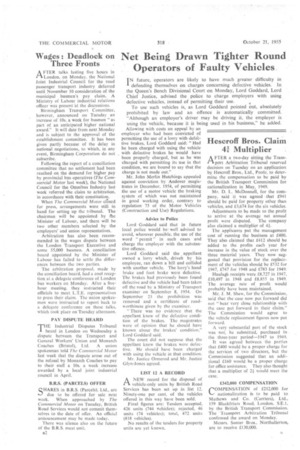Net Being Drawn Tighter Round Operators of Faulty Vehicles.
Page 36

If you've noticed an error in this article please click here to report it so we can fix it.
IN future, operators are likely to have much greater difficulty in defending themselves on charges concerning defective vehicles. In the Queen's Bench Divisional Court on Monday, Lord Goddard, Lord
Chief Justice, advised the police to charge employers with using defective vehicles, instead of permitting their use.
To use such vehicles is, as Lord Goddard pointed out, absolutely prohibited by law and an offence is automatically committed.
"Although an employer's driver may be driving it, the employer is using the vehicle, because it is being used in his business," he added.
Allowing with costs an appeal by an employer who had been convicted of permitting the use of a lorry with defative brakes, Lord Goddard said: "Had he been charged with using the vehicle with defective brakes he would have been properly charged, but as he was charged with permitting its use in that condition, we are bound to say that the charge is not made out."
Mr. John Merlin Hutchings appealed against conviction by Andover magistrates in December, 1954, of permitting the use of a motor vehicle the braking system of which was nut maintained in good working order, contrary to regulation 75 of the Motor Vehicles (Construction and Use) Regulations.
Advice to Police Lord -Goddard said that in future local police would be well advised to avoid, wherever possible, the use of the word " permit " in such cases and charge the employer with the substantive offence.
Lord Goddard said the appellant owned a lorry which, driven by his employee, ran down a hill and collided with another vehicle. The lorry's hand brake and foot brake were defective. The "brakes had previously been found defective and the vehicle had been taken off the road by a Ministry of Transport examiner on September 8, 1954. On September 23 the prohibition was removed and a certificate of roadworthiness given by the examiner.
"There was no evidence that the appellant knew of the defective condition of the brakes. The magistrates were of opinion that he should have known about the brakes' condition," Lord Goddard said.
The court did not suppose that the appellant knew the brakes were defective. He should have been charged with using the vehicle in that condition.
Mr. Justice Ormerod and Mr. Justice Gly n-J ones agreed.




































































































